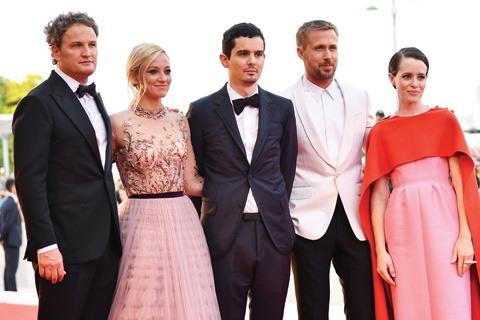 (From left) Actor Jason Clarke, actress Olivia Hamilton, director Damien Chazelle, actor Ryan Gosling and actress Claire Foy pose as they arrive for the opening ceremony and the premiere of the film ‘First Man’, presented in competition at the 75th Venice Film Festival at Venice Lido. — AFP photos
(From left) Actor Jason Clarke, actress Olivia Hamilton, director Damien Chazelle, actor Ryan Gosling and actress Claire Foy pose as they arrive for the opening ceremony and the premiere of the film ‘First Man’, presented in competition at the 75th Venice Film Festival at Venice Lido. — AFP photos
Everyone knows what Neil Armstrong said as he stepped onto the Moon, and when Ryan Gosling delivers the line in "First Man", which opened the Venice Film Festival on Wednesday, it sounds like dialogue as familiar as "To be or not to be". But Oscar-winning "La La Land" director Damien Chazelle takes the viewer deeper than that epic moment when Armstrong took "one small step for (a) man, one giant leap for mankind," to show what it must have felt like to leave the world behind, with a high chance of never coming back.
"This was a story that needed to hinge between the Moon and the kitchen sink," Chazelle said of the film that begins in 1961 as the United States trails the Soviet Union in the space race, through to the 1969 Moon landing - with many personal and professional crises on the way. At the kitchen sink is Armstrong's wife Janet, played by "The Crown" actress Claire Foy, who tells a friend she married the aeronautical engineer "because I wanted a normal life", but finds herself bringing up a family in extraordinary circumstances. The mundanity of real life in "First Man" contrasts with the enormity of the mission.
Armstrong is told he has been selected to head the Apollo 11 mission in the unglamorous setting of his work's toilet. When he tells his son he is going to the Moon, the boy replies by asking if he can play in the garden. "Their dad wasn't an astronaut, he was their dad," said Foy, who, like the rest of the cast, spoke to Armstrong's family to prepare for a film that dials down the patriotic glory and focuses on the bravery and frailty of its characters.
While the Oscar-winning space adventure "Gravity", which opened Venice in 2013, seduced audiences by the graceful beauty of floating above the Earth, "First Man" squeezes the viewer into a cramped capsule from which Armstrong gets occasional glimpses of the Moon as he steers towards touch-down - scenes Chazelle made deliberately claustrophobic and disorientating. "Space is obviously mostly this kind of black void, and you're travelling searching for objects, or searching for landing areas, in this expanse that is mostly completely nebular, and then on top of that you are in these kind of flying tin cans," he told reporters. "So everything about it felt terrifying to me and made me all the more the amazed that it even halfway worked out - so I wanted to capture that."
Co-produced by Steven Spielberg, "First Man" is based on a 2005 biography by historian James Hansen which hints at a remarkable gesture Armstrong may have made while standing on the Moon. In the movie's version of that scene, Armstrong lifts the reflective outer visor on his helmet, revealing his suppressed anguish as he remembers a tragedy in his life, many years ago and a world away, before composing himself for the journey home. "First Man" is one of 21 movies in competition for the Golden Lion which will be awarded on Sept 8.-Reuters
.jpg)
